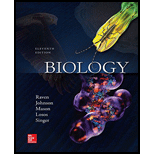
Biology
11th Edition
ISBN: 9781259188138
Author: Peter H Raven, George B Johnson Professor, Kenneth A. Mason Dr. Ph.D., Jonathan Losos Dr., Susan Singer
Publisher: McGraw-Hill Education
expand_more
expand_more
format_list_bulleted
Textbook Question
Chapter 48, Problem 3S
Explain how bacteria, archaea, protists, and many phyla of invertebrates can survive without respiratory organs.
Expert Solution & Answer
Want to see the full answer?
Check out a sample textbook solution
Students have asked these similar questions
PCBs and River Otters: Otters in Washington State’s Green-Duwamish River have high levels of polychlorinated biphenyls (PCBs) in their livers. PCBs can bind to the estrogen receptors in animals and disrupt the endocrine system of these otters. The PCBs seem to increase the estrogen to androgen ratio, skewing the ratio toward too much estrogen.
How would increased estrogen affect the river otter population?
Based on your reading of the materials in this unit, what factors can affect fertility in humans?
Explain how each of the factors affecting human fertility that you described can disrupt the human endocrine system to affect reproduction.
Other than oil and alcohol, are there other liquids you could compare to water (that are liquid at room temperature)?
How is water unique compared to these other liquids?
What follow-up experiment would you like to do, and how would you relate it to your life?
Selection of Traits
What adaptations do scavengers have for locating and feeding on prey?
What adaptations do predators have for capturing and consuming prey?
Chapter 48 Solutions
Biology
Ch. 48 - Prob. 1UCh. 48 - Increased efficiency of gas exchange in...Ch. 48 - Prob. 3UCh. 48 - Prob. 4UCh. 48 - Ficks Law of Diffusion states the rate of...Ch. 48 - Prob. 6UCh. 48 - Prob. 7UCh. 48 - Prob. 8UCh. 48 - When you take a deep breath, your stomach moves...Ch. 48 - Marine mammals are able to hold their breath for...
Ch. 48 - Countercurrent flow systems do not occur in lungs...Ch. 48 - Respiratory organs of invertebrates and...Ch. 48 - Prob. 5ACh. 48 - During exercise more oxygen is delivered to the...Ch. 48 - Compare the operation and efficiency of fish gills...Ch. 48 - What happens when, during exercise, the oxygen...Ch. 48 - Explain how bacteria, archaea, protists, and many...
Knowledge Booster
Learn more about
Need a deep-dive on the concept behind this application? Look no further. Learn more about this topic, biology and related others by exploring similar questions and additional content below.Similar questions
- Competition Between Species What natural processes limit populations from growing too large? What are some resources organisms can compete over in their natural habitat?arrow_forwardSpecies Interactions Explain how predators, prey and scavengers interact. Explain whether predators and scavengers are necessary or beneficial for an ecosystem.arrow_forwardmagine that you are conducting research on fruit type and seed dispersal. You submitted a paper to a peer-reviewed journal that addresses the factors that impact fruit type and seed dispersal mechanisms in plants of Central America. The editor of the journal communicates that your paper may be published if you make ‘minor revisions’ to the document. Describe two characteristics that you would expect in seeds that are dispersed by the wind. Contrast this with what you would expect for seeds that are gathered, buried or eaten by animals, and explain why they are different. (Editor’s note: Providing this information in your discussion will help readers to consider the significance of the research).arrow_forward
- What are intrinsically disordered proteins, and how might they be useful for a living system?arrow_forwardWhat are Amyloid Fibrils? What biological functions are these known to perform?arrow_forwardHow do histamine and prostaglandins help in the mobilization of leukocytes to an injury site? What are chemotactic factors? How do they affect inflammation process?arrow_forward
- Compare and contrast neutrophils and macrophages. Describe two ways they are different and two ways they are similar.arrow_forwardDescribe the effects of three cytokines (not involved in the initial inflammation response). What cells release them?arrow_forwardDescribe activation of helper T cells or cytotoxic T cellsarrow_forward
arrow_back_ios
SEE MORE QUESTIONS
arrow_forward_ios
Recommended textbooks for you
 Biology: The Dynamic Science (MindTap Course List)BiologyISBN:9781305389892Author:Peter J. Russell, Paul E. Hertz, Beverly McMillanPublisher:Cengage Learning
Biology: The Dynamic Science (MindTap Course List)BiologyISBN:9781305389892Author:Peter J. Russell, Paul E. Hertz, Beverly McMillanPublisher:Cengage Learning

Biology: The Dynamic Science (MindTap Course List)
Biology
ISBN:9781305389892
Author:Peter J. Russell, Paul E. Hertz, Beverly McMillan
Publisher:Cengage Learning
Respiratory System; Author: Amoeba Sisters;https://www.youtube.com/watch?v=v_j-LD2YEqg;License: Standard youtube license